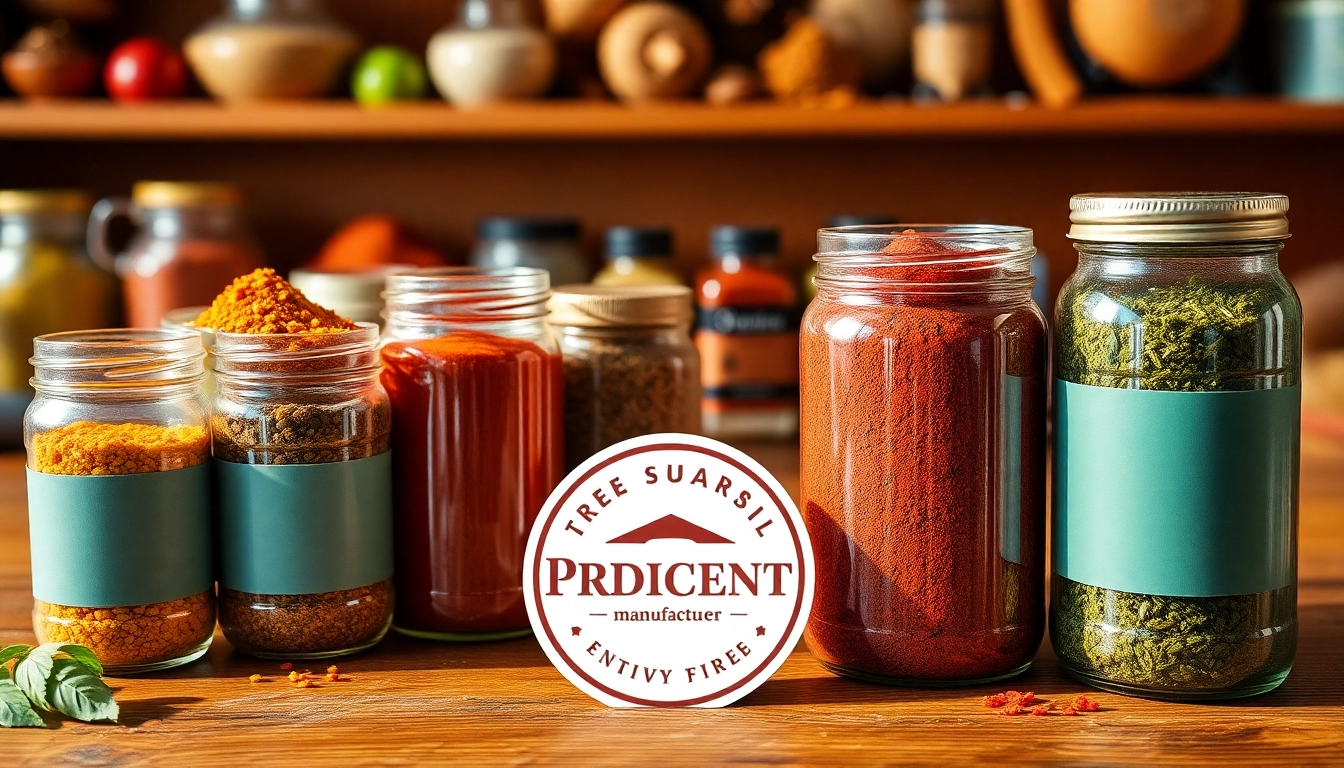Understanding the Role of a Manufacturer in the Food Industry
Defining a Reputable Food Manufacturer and Its Responsibilities
A reputable food manufacturer is a company dedicated to producing safe, high-quality food products that meet or exceed industry standards. These manufacturers are responsible for ensuring their products are consistently authentic, safe for consumption, and compliant with regulatory requirements such as FSSAI, ISO, and HACCP certifications. Their responsibilities extend beyond mere production; they include rigorous quality control, sourcing genuine ingredients, maintaining hygienic facilities, and implementing traceability systems to track each batch of products from raw materials to finished goods.
In today’s competitive market, a manufacturer also needs to innovate continuously, adopt sustainable practices, and uphold transparency to build consumer trust. For example, many leading manufacturers, including Manufacturer, showcase their dedication to quality assurance through certifications and participation in major food exhibitions worldwide.
Key Certifications and Standards for Food Manufacturing Companies
To establish themselves as trustworthy and reliable, food manufacturers pursue various certifications that validate their quality management and safety protocols. Some of the most prominent include:
- ISO 22000: International standard for food safety management systems.
- HACCP: Hazard Analysis and Critical Control Points, essential for identifying and managing food safety risks.
- FSSAI License: Indian Food Safety and Standards Authority certification ensuring compliance with local food safety laws.
- GMP (Good Manufacturing Practices): Ensures products are consistently produced and controlled according to quality standards.
- Organic and Halal Certifications: For products targeting specific consumer segments.
Such certifications not only enhance credibility but also enable the manufacturer to access international markets, participate in global trade shows, and meet the exacting standards of premium clients.
How a Manufacturer Maintains Product Consistency and Safety
Consistency and safety are the backbone of successful food manufacturing. Leading companies deploy comprehensive quality assurance systems, including:
- Stringent raw material selection and supplier verification processes to ensure authenticity.
- Utilization of cutting-edge production equipment that maintains hygiene and precision.
- Regular internal audits and third-party inspections to enforce compliance.
- Implementation of traceability frameworks to track batches from raw material to finished product, facilitating recall procedures if necessary.
- Training employees in hygiene and safety protocols to minimize contamination risks.
For instance, Spice Nest employs advanced production techniques, from modern milling machines to sterilization technology, ensuring all products—be it spices, pastes, or processed foods—are of consistently high quality.
Highlights of Spice Nest’s Manufacturing Excellence
Our Certification and Quality Assurance Processes
Spice Nest’s reputation as India’s largest manufacturer and exporter is rooted in strict adherence to international and domestic quality standards. The company maintains certifications like ISO, FSSAI, and organic accreditation, which attest to its commitment to purity and safety. Through rigorous quality assurance checkpoints at every stage—from raw material procurement, processing, to packaging—the company ensures that each product meets the highest standards of taste, purity, and safety. Regular audits and real-time quality monitoring systems help uphold these standards and foster continuous improvement.
Advanced Production Techniques and Equipment Used
Modern manufacturing facilities at Spice Nest incorporate state-of-the-art technology, including automated grinding, sterilization chambers, and sophisticated packaging machinery. This integration ensures uniformity in spice powders, preserves the natural aroma of whole spices, and maintains hygiene standards. For cooking pastes, cold extraction and pasteurization techniques retain active flavors and nutrients. The use of vacuum sealing and nitrogen flushing during packaging enhances shelf life without compromising quality, offering customers fresh and authentic products.
Commitment to Authenticity and Premium Quality Ingredients
Authenticity is at the core of Spice Nest’s brand ethos. The company sources raw materials directly from trusted farmers and plantations, ensuring genuine flavor profiles and superior quality. This commitment translates into products like certified organic herbs, premium select spices, and carefully crafted pastes that retain their natural taste. The focus on using authentic ingredients and precise processing techniques ensures that each product—be it a chutney or jam—delivers consistent satisfaction and trust to consumers.
Benefits of Partnering with the Right Manufacturer
Guaranteeing Product Authenticity and Safety for Consumers
A dependable manufacturer ensures that all products are authentic and safe, which is crucial in building consumer confidence. Certifications and transparent sourcing practices certify that consumers receive genuine products free from adulteration or contaminants. This reliability not only serves end-users but also helps brands they partner with to adhere to compliance mandates and avoid costly recalls.
Customization and Packaging Options for Brands
Leading manufacturers like Spice Nest offer tailored solutions, including customized packaging, labeling, and formulations to meet specific branding needs. Whether it’s bulk packaging for wholesale, retail-sized jars, or private labeling, manufacturers adapt their production lines to fulfill diverse client requirements, thereby providing flexibility and fostering long-term collaborations.
Ensuring Timely Delivery and Supply Chain Reliability
Efficient supply chain management is critical for maintaining product availability and fulfilling market demand. Reliable manufacturers implement sophisticated logistics planning, inventory tracking, and supplier relationships to ensure timely deliveries. Consistent supply chain performance minimizes stockouts, guarantees freshness, and enhances customer satisfaction.
Impact of a Trusted Manufacturer on Brand Success
Building Consumer Trust Through Quality Assurance
Consumers increasingly prioritize product safety and authenticity. Partnering with a trusted manufacturer assures quality, fosters brand loyalty, and differentiates products in a crowded marketplace. Certification-backed products from reputable manufacturers like Spice Nest demonstrate their commitment to excellence, making it easier for brands to establish credibility.
Enhancing Brand Reputation with Certified Products
Certifications and consistent quality control bolster a brand’s reputation, enabling it to command premium pricing and expand into international markets. When brands align with certified manufacturers, they leverage the manufacturer’s credibility to boost consumer confidence and open avenues at global trade shows, such as Biofach 2024 or other key events.
Case Studies of Successful Partnerships and Exports
For instance, Spice Nest’s participation and successful showcase at Biofach 2024 exemplify effective collaboration with international partners. Their certified products received global recognition, leading to increased export opportunities and strengthened brand positioning. Such case studies emphasize the importance of working with reputable manufacturers to achieve international success.
How to Select a Reliable Manufacturer for Your Food Business
Key Factors to Consider: Certifications, Capacity, Experience
Selecting a reliable manufacturer involves evaluating several critical aspects:
- Certifications: Verify adherence to quality and safety standards (ISO, FSSAI, organic).
- Production Capacity: Ensure the manufacturer can meet your volume requirements without compromising quality.
- Experience and Track Record: Review their history, client testimonials, and participation in industry trade shows.
- Innovation and Technology: Confirm the use of advanced equipment for consistent quality.
Questions to Ask During Manufacturer Evaluation
Engage potential partners with targeted questions such as:
- What certifications do you hold?
- How do you ensure product consistency across batches?
- Can you customize packaging and formulations?
- What is your lead time for bulk orders?
- How do you handle quality issues or recalls?
Steps to Establish a Successful Partnership and Ensure Quality Control
Building a successful relationship with a manufacturer involves:
- Performing thorough due diligence on certifications and reputation.
- Starting with small orders to assess quality standards and responsiveness.
- Maintaining clear communication channels and setting quality benchmarks.
- Implementing regular audits and feedback loops for continuous improvement.
- Documenting agreements clearly concerning supply timelines, quality standards, and escalation procedures.
Such a structured approach ensures that both parties are aligned, reducing risks and fostering trust.

